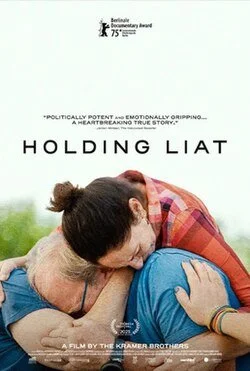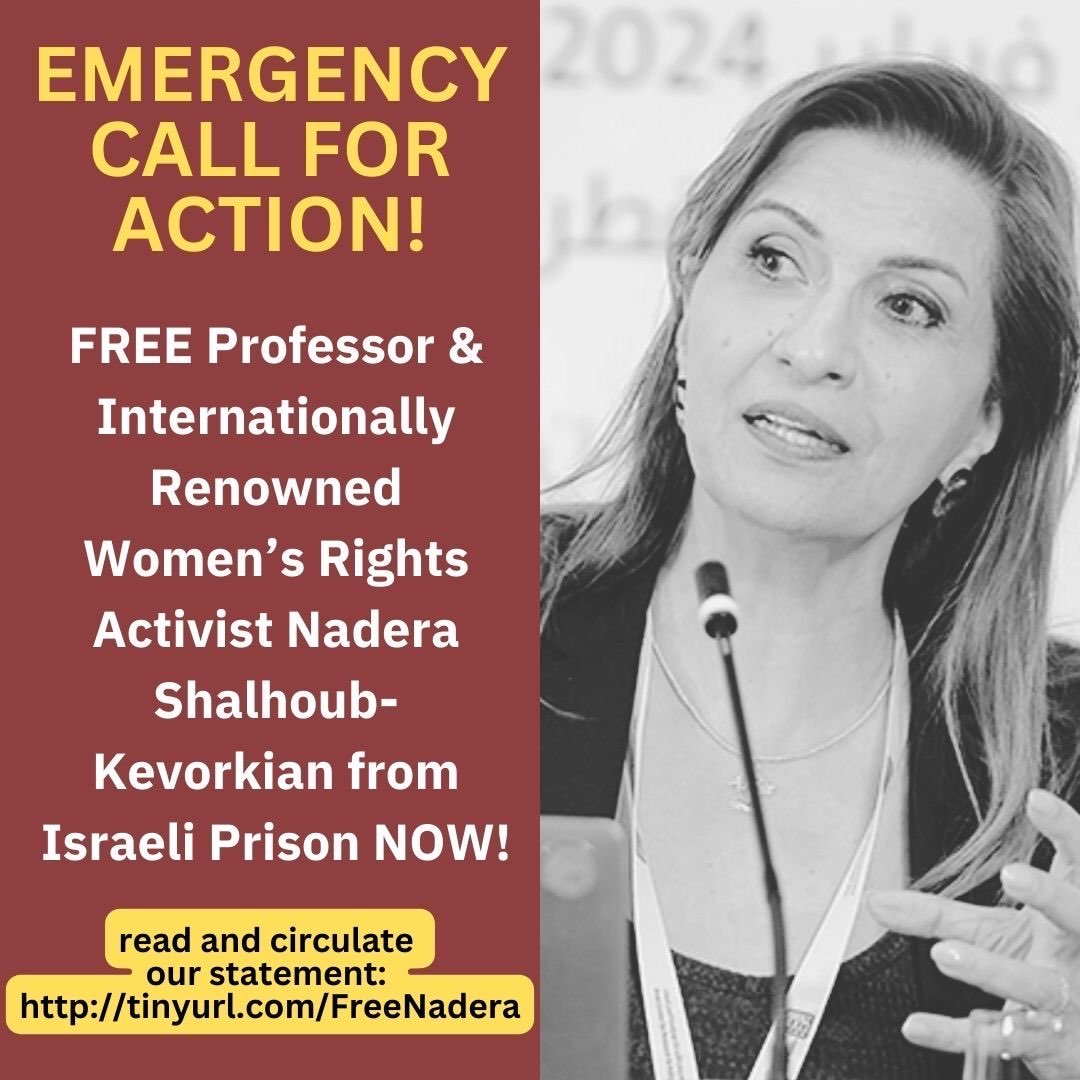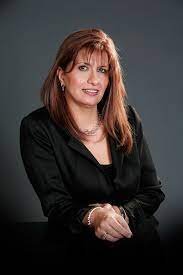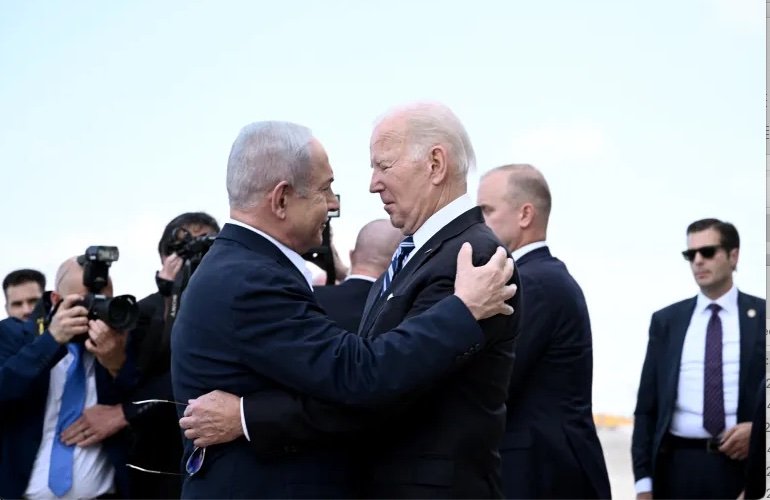
Holding Liat
In early January, “Holding Liat” was theatrically released at the Film Forum in New York. The film is directed by Brandon Kramer and produced by his brother Lance Kramer of Meridian Hill Pictures “Holding Liat” tells the story of my niece, Liat Beinin Atzili’s abduction during the Hamas attack on her home, Kibbutz Nir Oz, on October 7, 2023, and the family’s efforts to secure her release. Liat was freed and reunited with her three children and the rest of my American-Israeli family after 54 days in captivity. Less than 24 hours later, she learned that her husband, Aviv, was killed while defending their kibbutz home on October 7.

What’s the Point of Recognizing the State of Palestine?
At the September 2025 annual meeting of the United Nations General Assembly, the United Kingdom, France, Portugal, Australia, Canada, Monaco, Luxemburg, Malta, Andorra, and San Marino formally recognized the State of Palestine. Ten other countries, most importantly Ireland, Norway, Spain and Mexico, have recognized the State of Palestine since October 7, 2023.

July 2025: A Litany of Palestinian Death; American Institutions Continue Their Complicity
July 2025 was one of the most dreadful since Israel began its campaign to destroy Palestinian society in the Gaza Strip in response to Hamas’s horrific October 7, 2023 attack on Israel.

Who Represents the “Real Israel”?
“Netanyahu is not Israel – his government does not represent us!” proclaims a recent open letter of 160 Israeli writers, academics and intellectuals. “A war without political goals is a war of deception. A war in which more than 15,600 children have been killed is immoral,” they assert.
They believe that after the horrific October 7 massacre in the communities of the western Negev, Israel “set out to wage… a just war.” In contrast, “the war that began on March 18 with Israel's violation of the ceasefire and its failure to comply with the agreement to release the hostages” is not the same war.

Passover: Holiday of Freedom and Resisting MAGA Authoritarianism
This Passover I’m thinking about how we can resist authoritarianism in Israel and the United States. I offer two examples which aren’t organically related but share something of the same spirit of resistance.

A Fascist Salute, A Ceasefire, and Repression of Palestine Speech
Were you shocked and outraged by Elon Musk’s fascist salute during the celebrations of the inauguration of the 47th president of the United States? Was it, in the words of Philip Roth (in Operation Shylock) and Naomi Kein (in Doppelganger: A Trip into the Mirror World), “too ridiculous to take seriously and too serious to be ridiculous”? Is it a harbinger of Trumpite autocracy?

Students and Professors Maintain Solidarity with the Palestinian People
At Rhode Island State House, activists from the Providence community and Brown University denounced Israel for its continuing genocide in Gaza and U.S. government for its financial support of Israel.
Photo: Ashley Cai | The Brown Daily Herald
The extraordinary and totally unanticipated movement of solidarity with the Palestinian people that emerged on US and international university campuses during academic year 2023-24 ebbed during the fall 2024 semester. But it remained remarkably strong.

Chanukah and Gaza: History and Memory
Gaza, 2023, Credit: AP Photo/Ohad Zwigenberg
Chanukah may be the most contested holiday on the Jewish calendar. The history that gave rise to the holiday is the subject of two ancient books that are not included in the Tanach (the Hebrew bible).
…
How will American Jewish and Israeli popular culture remember the current Israeli war on Gaza? Several recent Israeli accounts document actions of soldiers that belie the narrative that this is a war of self-defense for Israel.

Yahrzeit (Memorial) for October 7
PHOTO CREDIT: Al Jazeera
Jews in Israel and around the world marked the one-year anniversary (yahrzeit) of the deaths of 1139 people killed by Hamas and its allies in the shocking and brutal attack of October 7, 2023. Some will mark it on October 24, which corresponds to the Hebrew date of Simchat Torah eve when the attack occurred. The victims included 695 Israeli civilians, among them 36 children, 373 military, police, and Internal security (Shabak) personnel, and 71 foreigners. My family suffered a direct loss that day.

Netanyahu Prefers Risking a Regional War to a Hostage Deal and an End to the Gaza War
PHOTO: © Ahmad Gharabli, AFP
On Sunday, Sept. 1 the Israeli army announced it recovered the bodies of six Israeli civilian hostages aged 23 to 40 in Rafah. Israeli army sources announced that Hamas fighters killed the hostages at point blank range a day or two before the army closed in on the tunnel in which they were found. Taking and murdering civilian hostages are serious war crimes according to International Humanitarian Law.
Five of the six, Ori Danin, Hersh Goldberg-Polin, Alexander Lobanov, Almog Sarusi, and Eden Yerushalmi, were seized at the Nova music festival. Carmel Gat was abducted from nearby Kibbutz Be’eri. Hersh Goldberg-Polin, whose parents addressed the Democratic Party’s national convention last month, was a US citizen. Some 100 hostages remain in Gaza. About one-third of them are presumed dead.
Many sectors of Israeli society erupted in protest upon hearing the news

Israel Has Lost the Gaza War, and Much Else as Well
Image from Tony Karon and Daniel Levy, “Israel is Losing This War,” The Nation
Growing numbers of Israeli observers have been saying publicly that Israel cannot win the Gaza war. Their judgment has nothing to do with what a new Human Rights Watch report defines as the war crimes and crimes against humanity that Hamas and its allies committed during their October 7, 2023 attack on Israel. Rather, it is a consequence of Israel’s response to October 7: a military strategy prioritizing mass bombardment, the annihilationist rhetoric of its military and political leaders, and media reporting that obscures the massive destruction, loss of civilian life, and humanitarian catastrophe that the rest of the world is witnessing (the daily Haaretz and +972 webzine are important exceptions).

Israel’s International Isolation and Drift Towards Authoritarianism
Israel’s continuing war on the Gaza Strip and the shocking accounts of the human carnage it is inflicting on Rafah are deepening its international isolation. Global opinion is outraged by the unrelenting live-stream display of gruesome Palestinian civilian casualties, the targeting of humanitarian aid workers and journalists, and images of wanton cruelty by Israeli soldiers circulating on social media. Diplomatic and legal measures long discussed as alternatives to the failed U.S.-managed “peace-process” are materializing more rapidly since Israeli leaders publicly announced their genocidal intentions in invading Gaza.

From Vietnam to Palestine: Campus Rebellions, 1968-2024
PHOTO CREDIT: Jews demonstrating near US Senate Majority Leader Chuck Schumer's home in Brooklyn, NY, Passover, April 23, 2024. (AP Photo/Andres Kudacki)
Here in the United States, the most prominent consequence of Israel's war on the Gaza Strip is the emergence of a broad-based movement in solidarity with the Palestinian people and in opposition to U.S. support for Israel's massive slaughter of civilians in full view.

Settler Colonialisms and Deadly Violence: Algeria and Israel/Palestine
The riveting artistic power of “The Battle of Algiers” rendered Algeria the best-known instance of settler colonialism and armed struggle for decolonization and national independence. The black and white newsreel style of the film and its compelling music uncompromisingly impress on the viewer both the structural and the kinetic violence of the French settler colonial regime and the urban terror unleashed by the Algerian National Liberation Front (FLN) in 1956-57.
A popular reading sees “The Battle of Algiers” simply as a justification of anticolonial armed struggle.

The Arrest and Persecution of Prof. Nadera Shalhoub-Kevorkian
Around 5 pm on Thursday, April 18, 2024, Hebrew University professor and internationally renowned feminist scholar Nadera Shalhoub-Kevorkian was arrested by Israeli police at her home in the Old City of Jerusalem on the charge of incitement to violence.

Israel: No Victory in War; No Political Redirection
Photo credit: Netanyhau: is the Obstacle to a (Hostage) Deal. Protesters call for a general strike outside of Tel-Aviv Histadrut union headquarters, April 6, 2024. (Iddo Schejter / The Times of Israel)
Journalists and pundits are assessing what Israel has and hasn’t accomplished as they mark the half-year anniversary of Hamas’s October 7 attack on Israel and Israel’s retaliatory war on Gaza.

Professor Nadera Shalhoub-Kevorkian Suspended from Teaching at the Hebrew University — Repression of Dissent in Israel and the USA
On March 12 senior administrators at the Hebrew University of Jerusalem suspended Professor Nadera Shalhoub-Kevorkian from teaching. Prof. Shalhoub-Kevorkian is a Palestinian-Israeli and holds the Lawrence D. Biele Chair in Law at the Faculty of Law-Institute of Criminology and the School of Social Work and Public Welfare at the Hebrew University and the Global Chair in Law at Queen Mary University of London. She is an internationally renowned scholar and specializes in trauma, state crimes, criminology, surveillance, gender violence, and violence against children.

Why Doesn’t President Biden See What We See in Gaza?
PHOTO: Netanyahu greeting Biden at Ben-Gurion Airport, Oct. 18, 2023. [Brendan Smialowski/AFP]
“I’m an American doctor who went to Gaza. What I saw wasn’t war — it was annihilation,” wrote Irfan Galaria in a Los Angeles Times opinion article describing his 10 days volunteering with MedGlobal in the Gaza Strip. Why doesn’t President Biden see what Dr. Galaria along with UN agencies, humanitarian organizations, human rights NGOs, and the International Court of Justice see: plausible evidence of genocide. Or, if he sees it, why does he actively abet it by defunding UNRWA, the largest humanitarian relief operation in the Gaza Strip, while continuing to arm and run international diplomatic interference for Israel?

Is Israel Losing the Gaza War?
Photo Credit: Grayscale Media/CARE
Tony Karon and Daniel Levy boldly proclaimed two months ago, “Israel Is Losing This War” (The Nation, Dec. 3, 2023). Karon is the editorial lead of Al Jazeera’s AJ+ and a former senior editor at Time magazine and activist in the South African anti-apartheid movement; Levy is a former Israeli negotiator with the Palestinians under prime ministers Ehud Barak and Yitzhak Rabin. They argue that Israel is seeking an impossible absolute military victory and Hamas is seeking a long-term political victory.
In a wide-ranging interview on Democracy Now! two months later, Levy confirmed and expanded on this judgement. He quoted former Israeli Chief-of Staff and current member of the war cabinet Gadi Eisenkot’s assessment that “complete victory over Hamas is unrealistic” and that “it’s not possible to return the hostages, alive, in the near term, without a deal.” Levy termed US proposals for a post-war arrangement – essentially a recommitment to establish Palestinian Bantustans that would be called a “state” – “magical thinking.”

After the International Court of Justice Ruling
On January 26, the International Court of Justice (ICJ), the highest international judicial forum and a branch of the United Nations, issued an interim order directing Israel to take provisional measures in response to South Africa’s case charging Israel with genocide. The Court ruled that Israel must refrain from committing genocidal acts of violence covered by the Convention on the Prevention and Punishment of the Crime of Genocide, “prevent and punish” public incitement to genocide (referring to the many statements by Israeli officials in command authority expressing apparent genocidal intent), and take immediate measures to provide humanitarian assistance to civilians in Gaza. The Court also ordered Israel to preserve evidence of genocide and to report to the Court within one month on the measures it has taken to carry out its order.
